
TEXT US

TEXT US
perththaimassage
January 15, 2025
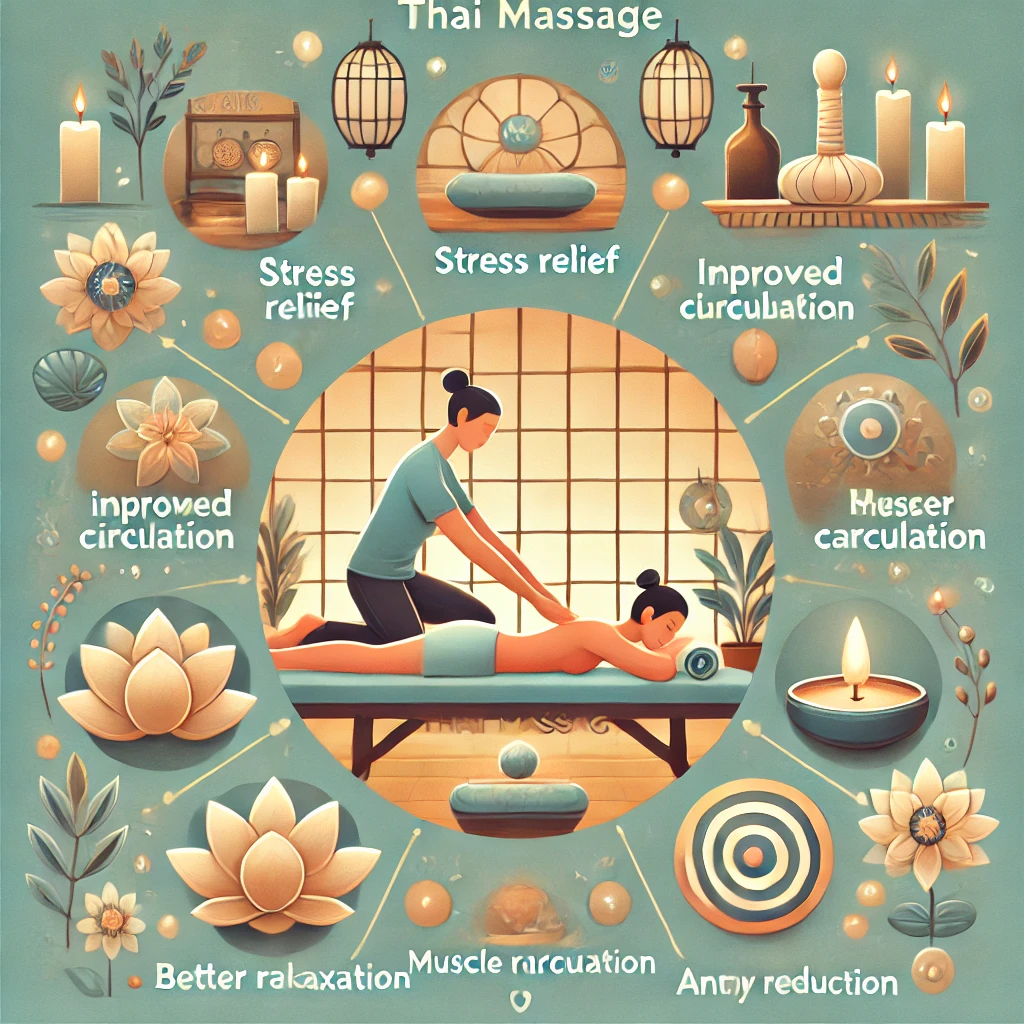
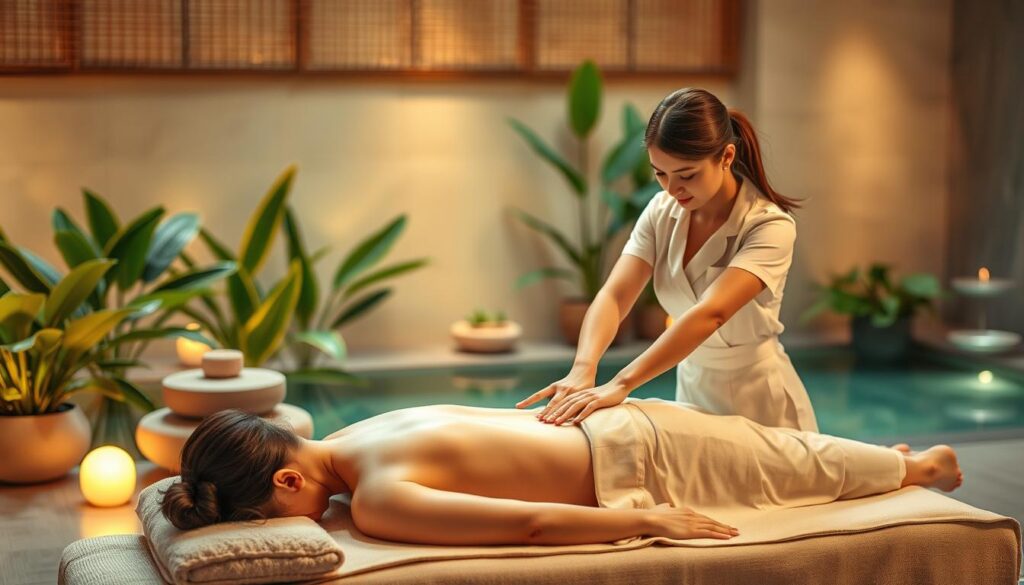


Do not hesitate to contact us. Your enquiries is most welcome.
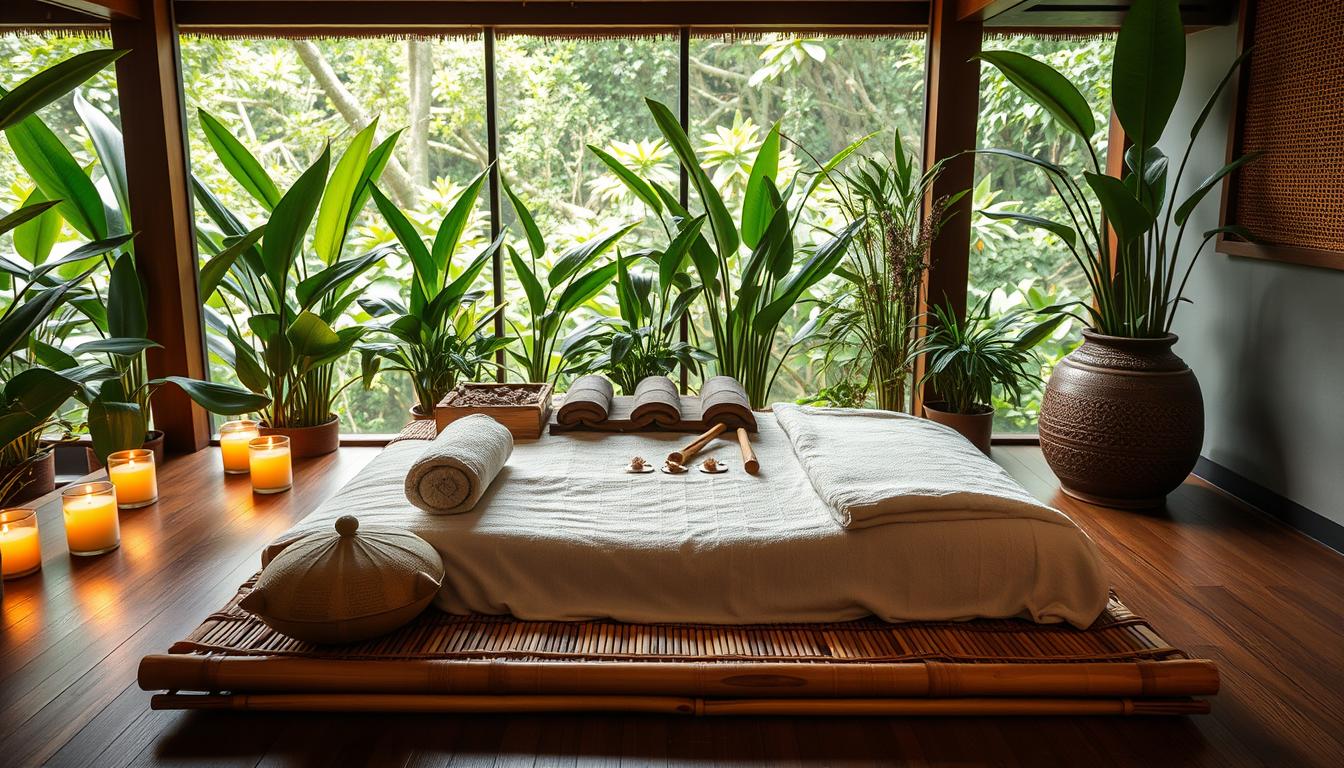
I’ve tried thai massage and it really helps with stress. It’s a great way to feel better and relax. For more info, check out stress relief techniques and see how thai massage can help.
Thai massage is perfect for those who want to chill out or ease pain. To start, visit the Perth Thai Massage website or call them to book. It’s changed my life for the better, and I’m eager to share its benefits with you.
Thai massage has a long history and combines physical and spiritual techniques. It started in Thailand over 2,500 years ago. It aims to balance the body’s energy and help you relax.
Thai massage is a holistic approach. It uses deep stretching, joint mobilization, and pressure point therapy. This creates harmony and balance in the body. Knowing its history helps you understand its depth and complexity.
Thai massage has been used for centuries to promote balance and harmony. It’s great for stress relief and relaxation. Adding thai massage to your wellness routine can bring many benefits.
Thai massage is an ancient practice that offers a special way to reduce stress. It combines physical and mental techniques for a complete relaxation experience. This makes it a great choice for those looking to relax and reduce stress.
Thai massage has many physical benefits. It improves flexibility, reduces muscle tension, and boosts circulation. These effects help the body relax and feel rejuvenated. The mental benefits are also significant, including less anxiety, a better mood, and improved focus.
Thai massage also has mental benefits. It reduces anxiety and improves mood. This promotes relaxation and reduces stress, helping you feel more focused and centered. Thai massage is a great way to achieve relaxation and stress relief through a holistic approach.
Thai massage is special because of its unique techniques and approach. It’s more dynamic than swedish massage, using deep stretches and joint mobilization. This makes it great for relaxation and stress relief.
Thai massage is different because the therapist gets involved more. They use hands, feet, and body weight to stretch and apply pressure. Swedish massage is gentler, focusing on long strokes and kneading. Thai massage’s pressure point therapy and energy work make it stand out for deep relaxation.
Thai massage has many benefits, including:
Thai massage is a unique and effective way to relax and reduce stress. It’s different from swedish massage in many ways.
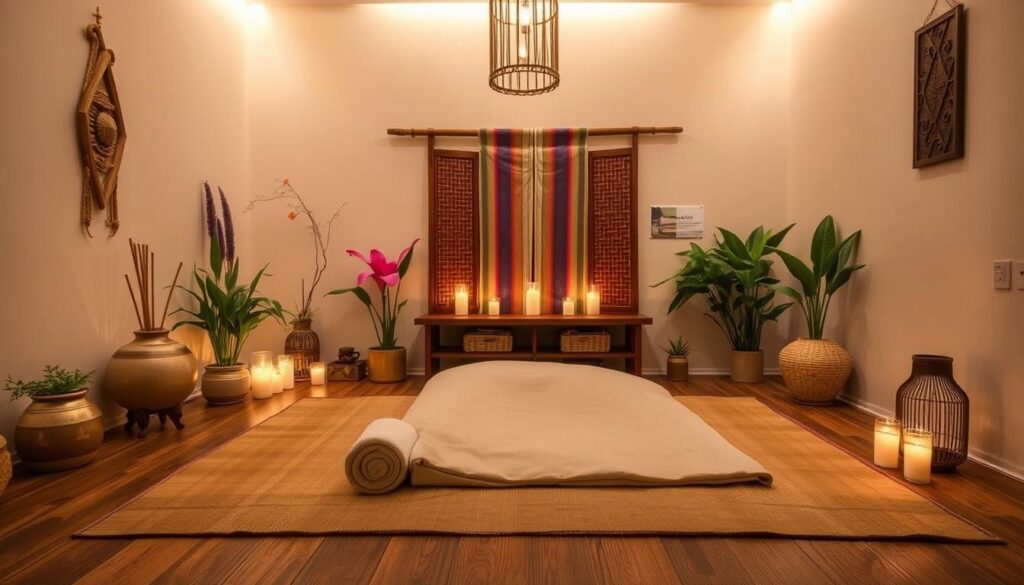
To get the most out of your thai massage session, proper preparation is key. Wear comfortable, loose-fitting clothes that let you move freely. For more tips, visit Perth Thai Massage.
Good preparation means clear communication. Tell your therapist about any tension or discomfort. This way, they can make your session perfect for you, ensuring it’s both relaxing and effective. Here are some important things to think about:
Proper preparation makes your thai massage session better. It lets you enjoy the relaxation and stress relief thai massage offers. Whether you’re new or experienced, getting ready is crucial for a great session.
The aim of thai massage is to help you relax and reduce stress. Being prepared and open with your therapist helps them tailor the experience for you. This way, you’ll leave feeling calm, centered, and refreshed.
Exploring thai massage reveals many myths and misconceptions. One big myth is that thai massage hurts. But, a skilled therapist makes sure it’s not painful. The goal is to relax and ease tension, not to hurt.
Some think thai massage is just for stretching. But it’s much more. It’s a way to balance body, mind, and spirit. Knowing the truth helps you enjoy your thai massage more. Here are some common myths and misconceptions:
Thai massage is actually a two-way practice. Both the therapist and client work together. This way, you get to relax, reduce stress, and feel better overall.
By clearing up these myths, you can see thai massage in a new light. It’s a journey, not just a single event. It needs patience, trust, and good communication. So, relax and let thai massage work its magic.
| Myth | Reality |
|---|---|
| Thai massage is painful | Thai massage should not be painful when performed by a trained therapist |
| Thai massage is only for flexibility | Thai massage is a holistic practice that aims to balance the body, mind, and spirit |
As I get ready for my thai massage, I’m curious about the session structure. A typical thai massage lasts 60-90 minutes. It combines physical and mental techniques to help you relax.
The session might include deep stretching, joint mobilization, and pressure point therapy. These are all aimed at making you feel more relaxed and centered.
The length and how often you need treatments depend on your goals and needs. For chronic pain, you might need more frequent sessions. But if you just want to relax and reduce stress, you might only need a session every few weeks. Here are some general guidelines for thai massage sessions:
Knowing what to expect during a thai massage helps me prepare better. Whether I’m looking to relax, reduce stress, or address chronic pain, thai massage is a powerful tool for wellness and relaxation.
Exploring thai massage, I’ve learned how vital breathing is. It’s woven into the practice, helping to relax and ease tension. Deep, rhythmic breathing calms the mind and body, making the experience more profound.
In thai massage, breathing is more than just natural. It’s a deliberate act that boosts the practice’s benefits. Relaxation is key, and breathing is central to achieving it. As I breathe, my body relaxes, my mind quiets, and my spirit refreshes.
Mindful breathing in thai massage offers several advantages:
Adding mindful breathing to your thai massage session can deepen relaxation. Focus on the present, letting go of thoughts and worries as you breathe.
Thai massage employs various breath techniques for relaxation and balance. These include deep, rhythmic breathing and conscious breathing. These methods help individuals become more aware and calm, leading to a richer thai massage experience.
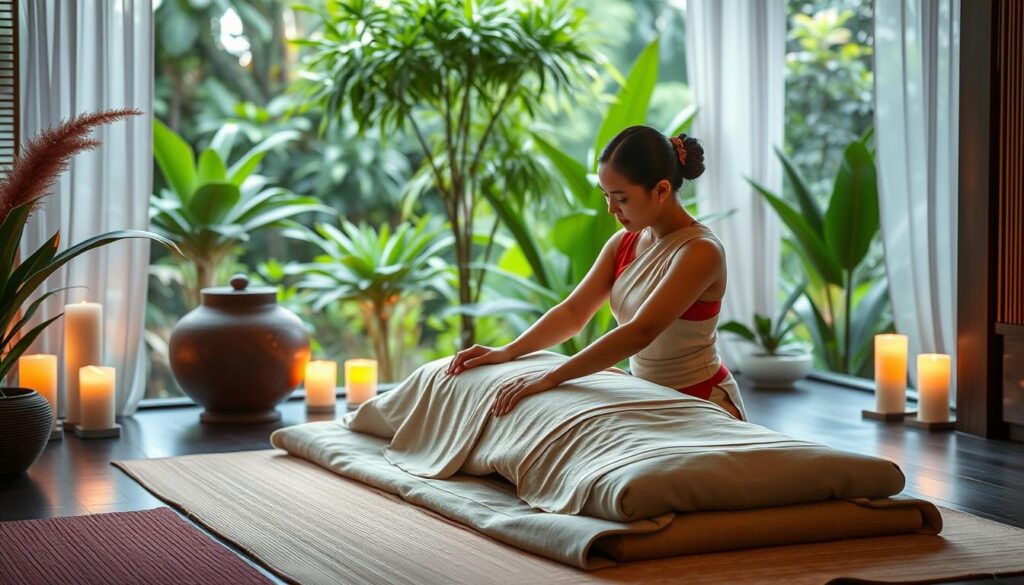
Finding a good thai massage practitioner is key. They should offer a safe and effective massage that meets your needs. Look for someone with proper training and certification in thai massage.
A trusted practitioner will have the right credentials. They might have a certification from a known institution. Before booking, ask about their techniques and what you’ll experience. This makes sure you’re comfortable and getting the best from your massage.
Before booking, ask a few questions. Find out about their techniques and what the session will be like. Also, ask how they’ll make the massage fit your needs. This way, you can have a relaxing and rejuvenating experience.
For a top-notch thai massage, check out https://perththaimassage.com.au/ or call/text 0493 773 807. A skilled practitioner will craft a massage just for you, focusing on relaxation and well-being.
To truly reap the benefits of Thai massage it’s essential to make it a regular part of your wellnessroutine. By scheduling periodic sessions and incorporating complementary practices, you can amplify the restorative effects on both your body and mind.
I find that most people benefit from Thai massage treatments once or twice a month. This frequency allows your body to fully integrate the relaxation and realignment. It also provides a consistent opportunity to de-stress and unwind. Your individual needs may vary, so it’s best to work closely with your practitioner to determine the optimal schedule.
Pairing Thai massage with other holistic practices can amplify its stress-relieving effects. I like to combine my massage sessions with mindful meditation, deep breathing exercises, and gentle yoga. By nurturing both the physical and mental aspects of well-being, I find I can achieve a more profound sense of balance and rejuvenation.
Ultimately, the key is to listen to your body and find the wellness routine that works best for you. With a little experimentation, you can discover the perfect integration of
Thai massage and other complementary activities to support your overall health and happiness.
Thai massage is an ancient practice from Thailand, over 2,500 years old. It combines physical and spiritual techniques to balance the body’s energy and relax. It uses deep stretching, joint mobilization, and pressure point therapy.
Thai massage is great for reducing stress and promoting relaxation. It improves flexibility, reduces muscle tension, and boosts circulation. It also helps with anxiety, mood, and focus.
Thai massage is unique, unlike other massages. It’s more dynamic and interactive, with deep stretching and joint mobilization. Its techniques, like pressure point therapy and energy work, make it stand out.
Wear comfy, loose clothes for your Thai massage. Talk to your therapist about any tension or discomfort. This ensures your session meets your needs and goals.
Some think Thai massage is painful, but it’s not. A skilled therapist aims to relax and reduce tension, not cause discomfort.
A Thai massage session lasts 60-90 minutes. It combines physical and mental techniques. Expect deep stretching, joint mobilization, and pressure point therapy. The session’s structure and duration depend on your needs.
Breathing is key in Thai massage, promoting relaxation and reducing tension. Deep, rhythmic breathing calms the mind and body. It helps reduce stress, anxiety, and improves focus.
Choose a reputable Thai massage practitioner for a safe and effective experience. Check their credentials and ask questions before booking. This ensures you know what to expect.
To benefit from Thai massage, include it in your wellness routine. Schedule regular sessions and practice mindful breathing and meditation. Combine Thai massage with yoga or acupuncture for better well-being.
Combining Thai massage with sleep hygiene practices can improve sleep quality. This includes establishing a bedtime routine and creating a comfortable sleep environment. This combination reduces stress and improves sleep.